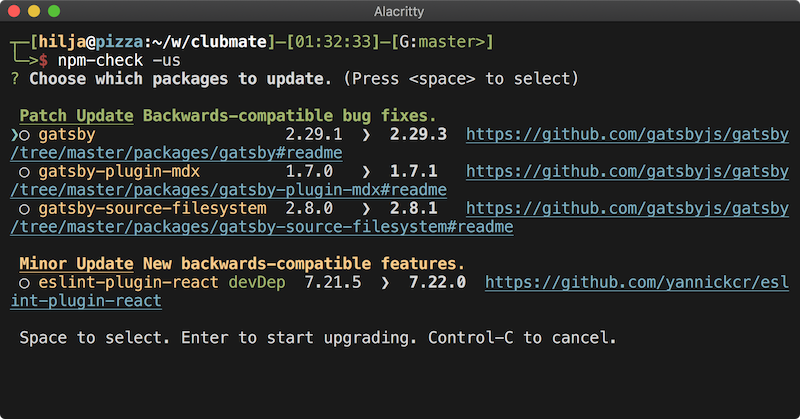clubmate.fi
A good[ish] website
Web development blog, loads of UI and JavaScript topics
How to easily keep a JavaScript project’s packages up to date
Here’s how to fly through your package update chores using some handy tools.
Ah, the pain of combing through your package.json and comparing version numbers in npmjs.org. This is a task that is relatively easy to automate.
The npm-check package
npm-check is a brilliant package which almost completely automates the process and provides a nice interface. Start by Installing it globally:
$ npm i -f npm-checkThe run it:
$ npm-check -usYou get a prompt showing you the outdated packages. Then press space to select a package to be updated, and hit enter to start the update process.

Here’s the explanations for the flags:
- -u
- Interactive update.
- -s
- Skip check for unused packages.
Running npm-check with legacy-peer-deps
You can’t pass npm-check any npm flags like --legacy-peer-deps which is a bummer. But you can make an .npmrc file in your project’s root where you can configure it legacy-peer-deps=true. Or you can configure npm globally npm config set legacy-peer-deps true.
Option 2: npm-check-updates
The package npm-check-updates does pretty much the same as npm-check, but with one extra step: the script updates the package version numbers in your package.json, then you run npm update manually.
Install globally:
$ npm i -g npm-check-updatescd into your project and run it:
$ npm-check-updatesThat’ll spew out a list of outdated packages for you to inspect. Then tell it to update the packages.json file:
$ npm-check-updates -uWhen it’s done, use the npm’s built in update command:
$ npm updateConclusions
Using npm-check has worked super good for me. This has really helped the package update anxiety.
Comments would go here, but the commenting system isn’t ready yet, sorry.